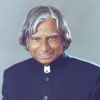Abdul Kalam

Abdul Kalam
Avul Pakir Jainulabdeen "A. P. J." Abdul Kalamwas the 11th President of India from 2002 to 2007. A career scientist turned politician, Kalam was born and raised in Rameswaram, Tamil Nadu, and studied physics and aerospace engineering. He spent the next four decades as a scientist and science administrator, mainly at the Defence Research and Development Organisationand Indian Space Research Organisationand was intimately involved in India's civilian space program and military missile development efforts. He thus came to be known...
ProfessionScientist
Date of Birth15 October 1931
CityRameswaram, India
Abdul Kalam quotes about
Nuclear scientists have always shown the country how nuclear technology can be used for increasing the agricultural produce, medical application and nuclear power generation.
As a young citizen of India, armed with technology and love for my nation, I realize, a small aim is a crime.
When grand plans for scientific and defence technologies are made, do the people in power think about the sacrifices the people in the laboratories and fields have to make?
The world has today 546 nuclear plants generating electricity. Their experience is being continuously researched, and feedback should be provided to all. Nuclear scientists have to interact with the people of the nation, and academic institutions continuously update nuclear power generation technology and safety.
Why are we, as a nation so obsessed with foreign things? Is it a legacy of our colonial years? We want foreign television sets. We want foreign shirts. We want foreign technology. Why this obsession with everything imported?
Our nation is facing a major challenge of uplifting 260 million people who are below poverty line and we have to give better life for many millions who are on border line of poverty or just above the poverty line. To meet the needs of one billion people we have the mission of transforming India into a developed nation .... We have identified five areas where India has a core competence on integrated action for agriculture, food processing, education and health care, reliable and quality electric power, surface transport and infrastructure for all parts of the country, information technology and other strategic sectors.
The right signal is that technology is going to boost (economic) development of our nation,
I have already met one million youth and when they grow up what they will say about me is most important for me.
My government is committed towards creating such an environment so that the latent potential of our people can blossom and create a new India of our dreams.
How accurately can the law fix the crime? There has to be a mechanism for very fast action. The law is like this: catch them and punish them.
A teacher should have a creative mind.
All wars signify the failure of conflict resolution mechanisms, and they need post-war rebuilding of faith, trust and confidence.
DONT DECLARE HOLIDAY ON MY DEATH, INSTEAD WORK AN EXTRA DAY, IF U LOVE ME
We need to create brand institutions. In the fortune 500 companies, 5 Indian companies are named while 15 are from China though we have similar kind of populations.